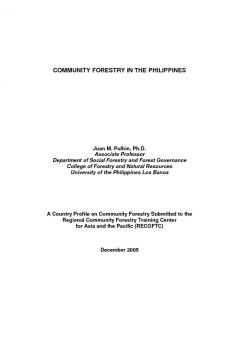Helping forests take cover
It may come as a paradox that while interest in tropical forests worldwide has been steadily growing in the last century, this has in no way halted the continued loss and degradation of one of earth's grandest terrestrial ecosystems. In fact, the extent and rate of degradation is accelerating. Some places have completely lost their original forests, while in others the structure and biomass of the forest have been irreparably damaged. Concern for this loss is not limited to the extinction of animal and plant species.
National Forest and Tree Resources Assessment 2003-05 - The Philippines
The Forest Resources Assessment (FRA) Project in the Philippines was initiated in August 2002 for the assessment of Philippine forest and tree resources as part of the framework of the Forest Resources Assessment Programme of the Food and Agriculture Organization of the United Nations (FAO) to support national forest assessments (NFA).
Suriname: Rural Sector Note
The preliminary conclusions put forward in this Rural Sector Note may be used as basis for further discussions between the Government and the World Bank to ascertain the mutual interest in any programme or project follow up.
Global planted forest thematic - supplement to Forest Resources Assessment 2005 - Guidelines for National Reporting Tables for Planted Forests
Globally, according to FRA 2000, planted forests accounted for only 5% of forest area, but up to 35% of industrial roundwood supply. This is anticipated to rise to 40-44% by 2020. Planted forests reflect a higher social, environmental and economic importance than their area would suggest. Many countries have existing planted forest data that is not based upon forest inventory, is incomplete and often outdated. Thus it is difficult to measure and plan the quantity and quality of planted forest resources and the provision of goods and services that they supply.
Situación de los bosques del mundo 2005
Situación de los bosques del mundo –que llega ahora a su sexta edición– presenta un panorama mundial del sector forestal en el que se ofrece la última informa-ción disponible sobre actividades y acontecimientos. Colaboraciones de organizaciones no gubernamen-tales (ONG), personas que actúan a título personal y funcionarios de la FAO ponen de relieve desafíos y oportunidades relacionados con algunas de las princi-pales cuestiones que están surgiendo actualmente.
Global forest land-use change 1990-2005: Initial results from a global remote sensing survey
The use of satellite imagery can substantially improve knowledge on changes in forest area as a result of deforestation, afforestation and natural forest expansion. This summary outlines some of the initial findings on forest land use and land-use change of a global remote sensing survey carried out to complement the country reporting process as part of the Global Forest Resources Assessments led by the Food and Agriculture Organization of the United Nations (FAO).
EUROPEAN FOREST SECTOR OUTLOOK STUDY - SUMMARY
The European Forest Sector Outlook Study (EFSOS), Main Report, is the sixth major study in the European outlook study series. It aims to provide decision makers in the forestry sector with information and analysis about long-term trends in the sector and projections of future developments.
Community Forestry in the Philippines
Dr. Juan Pulhin reports how the forest sector is addressing this challenge with some ambitious targets that include: uplands poverty halved in 15 years; forests under sustainable management, within 10 years; healthy forest-based industries, within 5 years in this report.
Cattle Accumulation and Land Use Intensification by Households in the Brazilian Amazon
In developing countries across the globe the impact of livestock on deforestation levels has
been profound. This paper explores the role of the cattle industry in household decision
making for small landholders in the Brazilian Amazon. Important inquiries raised in the
literature are addressed, including the determinants of the co-evolution of deforestation and cattle herds, the possibility of production specialization, and the role of cattle in household livelihoods. Panel data suggest that households have changed focus from crop
Fuzzy Logic and Preference Uncertainty in Non-market Valuation
In seeking to value environmental amenities and public goods, individuals often have trouble trading off the (vague) amenity or good against a monetary measure. Valuation in these circumstances can best be described as fuzzy in terms of the amenity valued, perceptions of property rights, and the numbers chosen to reflect values. In this paper, we apply fuzzy logic to contingent valuation, employing a fuzzy clustering approach for incorporating preference uncertainty obtained from a follow-up certainty confidence question.
A Choice for China: Ending the destruction of Burma's frontier forests
(Press release): "... Ending the destruction of Burma’s northern frontier forests" , details shocking new evidence of the massive illicit plunder of Burma’s forests by Chinese logging companies. Much of the logging takes place in forests that form part of an area said to be “very possibly the most bio-diverse, rich, temperate area on earth.”



